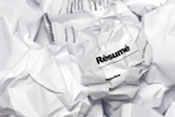Preparing a Winning Resume
|
|
 | |
| Main focus in writing a resume is to highlight your marketable skills or the skills of the client you are writing the resume for. |
The main focus of writing a resume in any field is to highlight your marketable skills or the skills of the client you are writing the resume for. The highlighted skills should show how well the potential employee will fit into the employer’s business. The craftsmanship of the writer will also draw attention away from any shortcomings the prospective employee may have, such as a lack of experience. At the same time, the resume should highlight the positive parts of the person’s qualifications.
If experience in a field is lacking, there are a few things the writer can do to ensure that the prospective employee has a strong resume. In the absence of strong experiences that align with the job you are applying for, highlight the positive things you have done during your career and, more importantly, how those skills can transfer to this new position. Bring attention to accomplishments from previous positions. Focus on certifications and licenses that you have earned and on any training or schooling you’ve completed. These accomplishments may not be in the same field you are applying to, but they will show the employer that you are willing to work hard to move forward and upward. Any time you exceeded what was expected of you is worth mentioning in a resume. The combination will make you more desirable as an employee and will give you a better chance of getting the position you deserve.
 | |
| A bad resume can mean that you don't even get the opportunity to interview, causing you to miss out on a great job you qualify for. |
Always remember that, as a writer, you should focus on the needs of the company in question and tailor the resume to match the employer’s requirements. Chances are that you or the person you are writing for have done something similar to what the employer needs done and that you can tailor the resume to the desired position.
When it comes to professional jargon, you should be aware of a few things before you use it. Professional jargon in a resume demonstrates a familiarity with the given profession and a working knowledge of the field you are applying for. However, it can also isolate you from the layman and limit your search to that specific professional field. If used too much, jargon will also make your resume appear too flashy, rendering it unusable for its intended purpose. You should remember that even if you are applying for a very technical job, the person who reads your resume might not be in that same field. As such, they may simply be looking for how well you fit the job qualifications, not for how well you talk the talk. Accordingly, you should keep the jargon to a minimum. Generally, you will be better off, in any industry, with a simple, straightforward resume. Don't just fill space, though. You want to present the information in a way that is as organized as possible and choose the important things you want a prospective employer to know about you. If organized well, the resume should fit onto one page. Keep it simple and tightly done.




